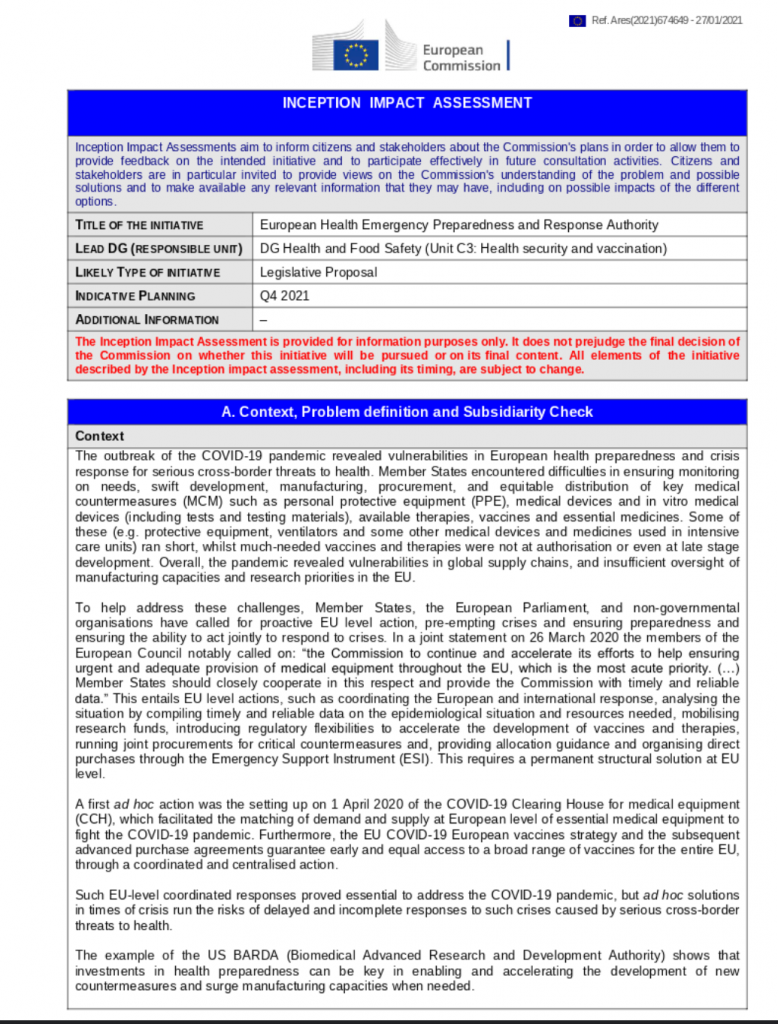KEI Europe comments on the European Health Emergency Preparedness and Response Authority (HERA) road map
24 February 2021
Whilst calls for better coordination in the EU pandemic response are welcome, HERA must put the global right to health, rather than regional biosecurity concerns, at its heart. Rapid operationalisation, as demanded by global public health needs, must not and need not come at the cost of ossifying poor practices into governance frameworks. The EU should, when possible, require collaboration and sharing of knowledge and resources, rather than secrecy, hoarding of manufacturing know-how, and blocking access to biologic resources. The lack of global solidarity, particularly as developing countries, appears to be a common thread throughout this proposal, which is regrettable.
Licensing practices
The new voluntary licensing mechanism should not have a geographic limit. The EU needs to address its relationship to the WHO COVID-19 Technology Access Pool (C-TAP) and the work of the Medicines Patent Pool.
In addition to the immense public investment through funding of early stage research, and de-risking of investments through advance purchasing agreements, HERA needs to attach clauses guaranteeing downstream access and affordability, as well as the transfer of manufacturing know-how to third parties to achieve greater scale and faster delivery of products. The EU should endeavor to be more inclusive as regards access, not just for member states, and to constructively address the disparities in access in developing countries, including by the transfer of manufacturing know-how globally.
Public-private collaboration can be both useful and necessary. The licensing agreements should seek to achieve broad public rights in both foreground and background intellectual property, and when possible, enable data, inventions and know-how to immediately enter the public domain as global public goods.
Licensing agreements should include adequate step-in rights in case of later breach of access protections, and when possible, reach-through clauses such that further licensing retains the aforementioned protections. The license should require the waiver of supplementary patent protections and excessive regulatory protections. Exclusive rights in regulatory test data should be waived by the licensee, but the licensing of rights in data can be remunerative on reasonable terms.
Transparency
Opacity of contracts generates information asymmetries that often benefit drug and vaccine companies the most, unduly protect government and Commission officials from criticism from the public if the negotiated instruments have shortcomings, and create uncertainty and mystery as regards important policies embraced.
With the exception of Germany and Hungary, all EU member states have agreed to the WHO transparency resolution (WHA 72.8), and the specific transparency norms in the resolution should be honored, including transparency of net prices, patent landscapes, units sold, sales revenues, subsidies and incentives, registration status in countries, the costs of human subject clinical trials and the outcomes from trials.
Technology transfer
We support greater EU manufacturing capability, but implemented with the goal of enhancing development and capacity globally.
Delinkage
The role of HERA extends to well beyond the end of the COVID-19 pandemic. The EU needs to explore the future mechanisms to fund incentives to invest in the development of drugs, vaccines and other countermeasures, that are delinked from exclusive rights or high prices, and which are consistent with sharing access to manufacturing know-how and cell lines and rights in inventions and data. And if the knowledge resources are to become global public goods, the financing of such incentives should also be global, or at least, among a community of like minded countries larger than the EU.
WTO
EU members need to notify the WTO they are opting back into TRIPS 31bis as importing countries. See: https://www.keionline.org/32707

